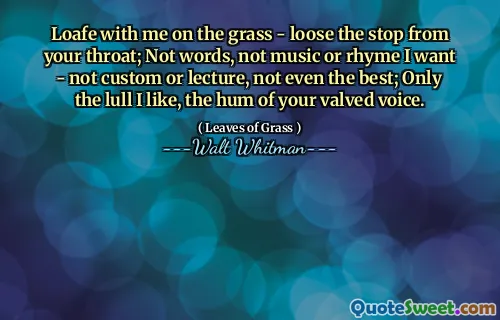"Leaves of Grass" is a groundbreaking collection of poetry by Walt Whitman, first published in 1855. The work is notable for its celebration of individualism and the human experience, reflecting themes of democracy, nature, and the interconnectedness of all life. Whitman's style is marked by free verse, which allows for a more natural flow of thought and emotion, stepping away from traditional poetic forms. The title itself symbolizes the idea that all life is as valuable as blades of grass, emphasizing equality among people and the beauty of the natural world.
The collection is woven with personal reflections and observations, inviting readers to connect deeply with the poet's vision. Whitman's writing often speaks directly to the reader, creating a sense of intimacy and urgency. His poems range from the joyous to the contemplative, exploring subjects like love, death, and the passage of time, all while urging readers to embrace their own identities and experiences. Each poem contributes to a larger narrative about the human condition and the search for meaning.
More »
Today Birthdays
1729 -
Edmund Burke
1949 -
Haruki Murakami
1954 -
Howard Stern
1876 -
Jack London
1993 -
Zayn Malik
1951 -
Kirstie Alley
1863 -
Swami Vivekananda
1923 -
Alice Miller
1987 -
Naya Rivera
1825 -
Brooke Foss Westcott
1944 -
Joe Frazier
1951 -
Rush Limbaugh
1964 -
Jeff Bezos
1978 -
Jeremy Camp
1628 -
Charles Perrault
1856 -
John Singer Sargent
1970 -
Kaja Foglio
1953 -
Rick Santelli
1986 -
Gemma Arterton
1968 -
Raf Simons
1958 -
Christiane Amanpour
1966 -
Olivier Martinez
1996 -
Ella Henderson
1917 -
Maharishi Mahesh Yogi
1949 -
Ottmar Hitzfeld
1928 -
Ruth Brown
1968 -
Heather Mills
1946 -
George Duke
1968 -
Rachael Harris
1923 -
Ira Hayes
